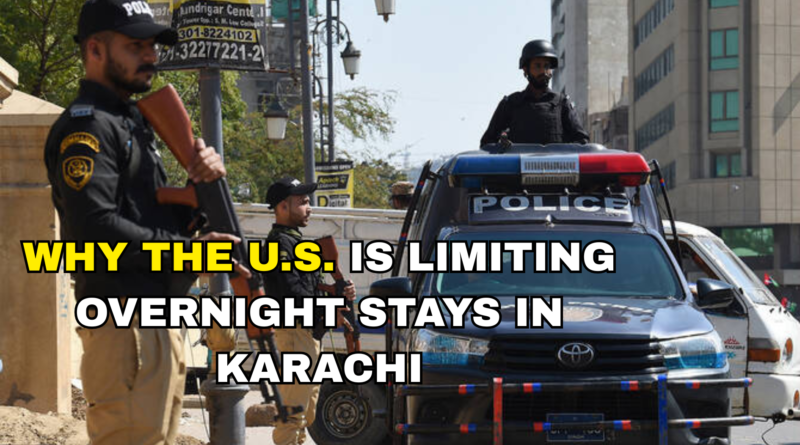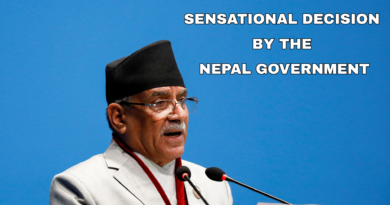WHY THE U.S. IS LIMITING OVERNIGHT STAYS IN KARACHI
The United States government has recently issued a warning about the safety of its officials in Karachi, Pakistan. This warning comes after intelligence reports suggested that there could be a threat to American personnel staying in hotels in the city. As a result, the U.S. has limited official travel and hotel stays in Karachi for its diplomats and other government representatives. This decision has brought attention to the city’s security situation once again.
What Happened?
The U.S. Embassy in Islamabad released a security alert. In it, they said that American officials are not allowed to stay overnight in hotels in Karachi for now. The embassy also said that the decision was taken after careful review of a threat report. Although the full details of the threat have not been made public, it was serious enough to trigger an official response. The U.S. has a responsibility to protect its citizens and staff abroad, so this move was made as a precaution.
Why Karachi?
Karachi is the largest city in Pakistan and one of the most important economic hubs in South Asia. However, it has also seen many incidents of crime and terrorism over the past few decades. While security in Karachi has improved in recent years, concerns remain about the possibility of attacks, especially on foreign nationals. Militants and criminal groups have sometimes targeted government officials, hotels, and places where foreigners stay or visit. These risks may have increased recently, prompting the U.S. to act.
What Is a Travel Advisory?
A travel advisory is a public notice issued by a government to inform its citizens about risks when traveling to certain places. In this case, the U.S. has not issued a full travel ban for Karachi, but it has placed restrictions on where its officials can stay. This is a specific measure and is different from telling all American citizens to avoid the city. It means that the U.S. government wants to avoid putting its employees at risk.
Impact on Diplomatic Work
The decision may slightly affect the movement of U.S. officials in Karachi. They may need to plan shorter visits or avoid certain meetings that would require overnight stays. This could delay or change some diplomatic and consular activities in the city. However, the U.S. is expected to continue its work in Pakistan through other cities and virtual platforms if needed. Safety is always the top priority for any embassy or consulate.
Reaction from Pakistan
So far, the Pakistani government has not made an official statement about the U.S. advisory. However, this type of warning could lead to discussions between U.S. and Pakistani officials about improving security. Pakistan has often worked with international partners to provide protection to foreign diplomats. It is possible that more security will be provided at hotels or areas frequented by foreigners in Karachi.
Hotels Under Watch
Though the U.S. alert does not name any specific hotels, it is likely that major international hotels in Karachi are being closely watched by both U.S. and Pakistani security services. These places often host diplomats, businesspeople, and tourists. If there is a credible threat, hotels may increase security checks, use sniffer dogs, and even involve intelligence agencies to ensure the safety of guests. Travelers may experience some delays or inconvenience, but these steps are meant to protect everyone.
What Should American Citizens Do?
The U.S. Embassy has asked American citizens in Karachi to be careful and avoid unnecessary travel, especially to crowded or sensitive areas. They are encouraged to remain alert, review their personal security plans, and stay in contact with the embassy. U.S. citizens living in or visiting Pakistan are often advised to enroll in the Smart Traveler Enrollment Program (STEP), which helps the embassy contact them in emergencies.
Past Incidents in Karachi
Karachi has a long history of violence, although security forces have managed to reduce many threats in the last decade. There have been past attacks on consulates, hotels, and even police stations. In 2016, terrorists attacked the Chinese consulate in Karachi. In 2020, gunmen attacked the Pakistan Stock Exchange building. These events highlight that while improvements have been made, risks still exist.
Importance of Security Cooperation
This situation shows how important it is for countries to share intelligence and work together on security. The U.S. and Pakistan have cooperated in the past on counterterrorism and intelligence-sharing. If the threat report is based on such cooperation, it may lead to quicker action to prevent any incidents. Both governments have a common interest in ensuring that diplomats, tourists, and local citizens are safe.
Looking Ahead
In the coming weeks, the U.S. may review its decision depending on how the security situation develops. If the threat decreases or is eliminated, the restrictions on hotel stays in Karachi may be lifted. Meanwhile, other countries may also issue their own advisories if they receive similar intelligence. Karachi’s local government and law enforcement agencies may take this opportunity to strengthen their security systems further.
Final Thoughts
The safety of diplomats and foreign visitors is very important for international relations. The U.S. government’s decision to restrict hotel stays in Karachi is a temporary but necessary step based on current threat reports. While this may cause minor disruptions, it is aimed at preventing harm. Everyone-governments, security agencies, hotels, and citizens-has a role to play in keeping the environment safe. With cooperation and proper planning, the city can continue to host international guests without fear.




